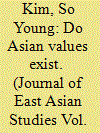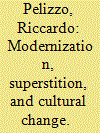| Srl | Item |
| 1 |
ID:
096600


|
|
|
|
|
| Publication |
2010.
|
| Summary/Abstract |
The Asian values debate has been long on speculative advocacy but short on empirical validation, with statistical tests emerging only lately. This study explores two questions: whether Asians indeed hold distinct cultural attitudes when compared with non-Asians and whether these cultural attitudes and beliefs identified as Asian values form coherent dimensions among Asians. The study first identifies four dimensions of Asian values based on a review of various Asian values discourses: familism, communalism, authority orientations, and work ethic. The findings from the empirical analysis based on multilevel models and factor analysis return mixed support for the Asian values hypothesis. Although East Asian respondents do exhibit strong work-related values compared with those from other regions, commitment to familial values and authoritarian orientations are actually lower among East Asians. Also, while preference for strong leadership and parental duty do turn out to form distinct sets of attitudes among South and Southeast Asians, the four dimensions do not constitute a clear value complex in the minds of East Asians.
|
|
|
|
|
|
|
|
|
|
|
|
|
|
|
|
| 2 |
ID:
193265


|
|
|
|
|
| Summary/Abstract |
By exploring the relationship between socioeconomic development, secularism, and the pervasiveness of traditional beliefs, this article shows that while some traditional practices and beliefs, such as making use of traditional healers, are negatively and significantly related to several development indicators, there is little to no detectable (statistical) relationship between other traditional beliefs and practices, such as believing in and seeing a jinn, and development. The evidence presented in the article sustains the claim, advanced at the turn of the millennium by Inglehart and Baker, that the impact of socioeconomic development on values, attitudes, and cultural change is complex and non-linear.
|
|
|
|
|
|
|
|
|
|
|
|
|
|
|
|
| 3 |
ID:
089892


|
|
|
|
|
| Publication |
2009.
|
| Summary/Abstract |
Using a research design that traces siblings' preferences for postmaterialist values in Germany over two decades, this article provides new evidence on the origins of value preferences. Focusing on Inglehart's thesis of value change, the combined socialisation and scarcity hypothesis is tested against the social learning hypothesis - a prominent rival account of preadult value preference formation. Sibling estimates show that the shared preadult environment does indeed exert lasting effects on preferences for postmaterialist policies. In addition to the weak effect of the shared experience of socioeconomic scarcity, it is found that the intergenerational transmission of postmaterialism, disregarded by Inglehart's original thesis, plays a significant role in value preference acquisition. The implications of individual-level findings for forecasts of aggregate-level trends in value change are discussed.
|
|
|
|
|
|
|
|
|
|
|
|
|
|
|
|